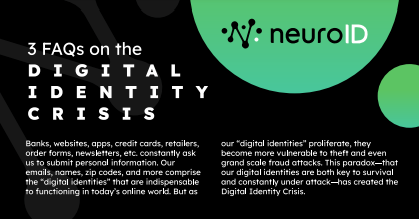
3 Principles for Women Disruptors: The Rebel Lawyer’s Guide to Success
NeuroID’s Trailblazing Women Profile Series: Jacky Junek, Vice President of Legal and Compliance at NeuroID
Lawyers don’t often seek out uncharted territories. From the first day in law school, they’re taught to plan for worst-case scenarios (and then avoid the unknown at all costs). So, why would a graduate of the University of Minnesota Law School and top-of-her-field legal counsel at a centenarian bank leave to join NeuroID in the start-up world, where we’re building the future of identity verification and behavioral analytics from the ground up?
“I’m always seeking out jobs that require more of me,” says Jacky Junek, looking back on her bold move of leaving Wells Fargo and Morgan Stanley for the tech disruptor industry. “I like variety and being part of a decision-making strategy. There’s only so much I can take of corporate transactions and tax implications, and while I still serve that role at NeuroID it’s much more exciting to share that ownership with the smart and impressive people who lead the teams here.”
In just over a year at NeuroID, Jacky has become a strong company leader, helping trailblaze into the wild west of behavioral analytics and redefining not just how digital businesses build their identity verification stacks, but also how NeuroID creates its own internal identity as it grows from disruptor to industry leader.
In celebration of Women’s History Month at NeuroID, we asked Jacky to share three guiding principles for helping trailblazing women like herself take bold moves and forge a similar change-maker’s path in any industry.
Principle 1:
Embrace Discomfort.
“One thing I love about being at NeuroID is it’s often the first time we’re doing something. And that’s hard and exciting. I had to learn to be comfortable with that discomfort,” says Jacky. As a woman working in law, tech, and finance, Jacky has been a minority at every company she’s worked for. “Plus I’m really short,” she adds, “Historically, people don’t take me seriously. I’ve always had to fight against that and will likely continue to for the rest of my career.” Fighting for a voice is hard for most people, and especially for women and other minorities. Pushing past the discomfort of speaking up and instead embracing that discomfort as a sign of growth and change is a vital part of Jacky’s trailblazer toolkit.
Principle 2:
Imposter Syndrome? Schmiposter Syndrome
According to a recent KPMG report on women’s leadership, more than 75% of executive women say they have personally felt imposter syndrome and 74% of those same women think that men do not experience it at the same level. Imposter syndrome is the well-documented psychological phenomenon of feeling like a fraud, despite all evidence to the contrary. KPMG is just the latest researcher to find that imposter syndrome affects women more; it’s often cited as a reason many women don’t push for more pay or pursue higher roles. Whether it’s due to gender and socialization stereotypes, lack of representation, or other factors, the impact is real and can be debilitating.
“One of the best ways I overcame imposter syndrome was by creating a ‘Yay Jacky!’ folder,” says Jacky, who is one of those 75% of high-achieving women still fighting back the feeling of self-doubt. “Early in my career, I established a special folder to house any emails that recognized my work or other documents that I was proud of or otherwise made me feel good. I have created this ‘Yay Jacky’ folder at each company I’ve worked for to remind myself that I do good work, which can be very helpful on hard days.” Another way that Jacky works to fight that imposter-internal-whisper? Talking about it with other women. “Too many women are used to struggling alone with questions about how to tackle professional challenges, be it imposter syndrome, worry about maternity leave, or how to approach a hard conversation. Having other women colleagues to trust and talk with is huge.”
Principle 3:
Build Strong Relationships with Your Community of Women.
That trust and transparency mindset led Jacky to create NeuroID’s first Women’s Employee Resource group. “This is our trial year, and it’s been going great,” says Jacky. “Every other meeting we invite male colleagues to join us so they can recognize the issues on our mind and be a part of the discussion. We need allies if we want things to change!”
The Women’s Employee Resource Group comes from Jacky’s experience of the power of a community of women to promote leadership. “Women need to pull up other women,” says Jacky. “We don’t always need or have access to direct mentor and mentorship roles, but we can build a community of transparency where we aren’t afraid to ask questions and talk through issues. Over 51% of all law school students are now women. It’s an exciting trend to see in a traditionally male-dominated field. I’d love for women to make up 51% of leadership at every level.”
This is the first of a series highlight trailblazing women at NeuroID. Want to read the rest? Subscribe to our blog below!



